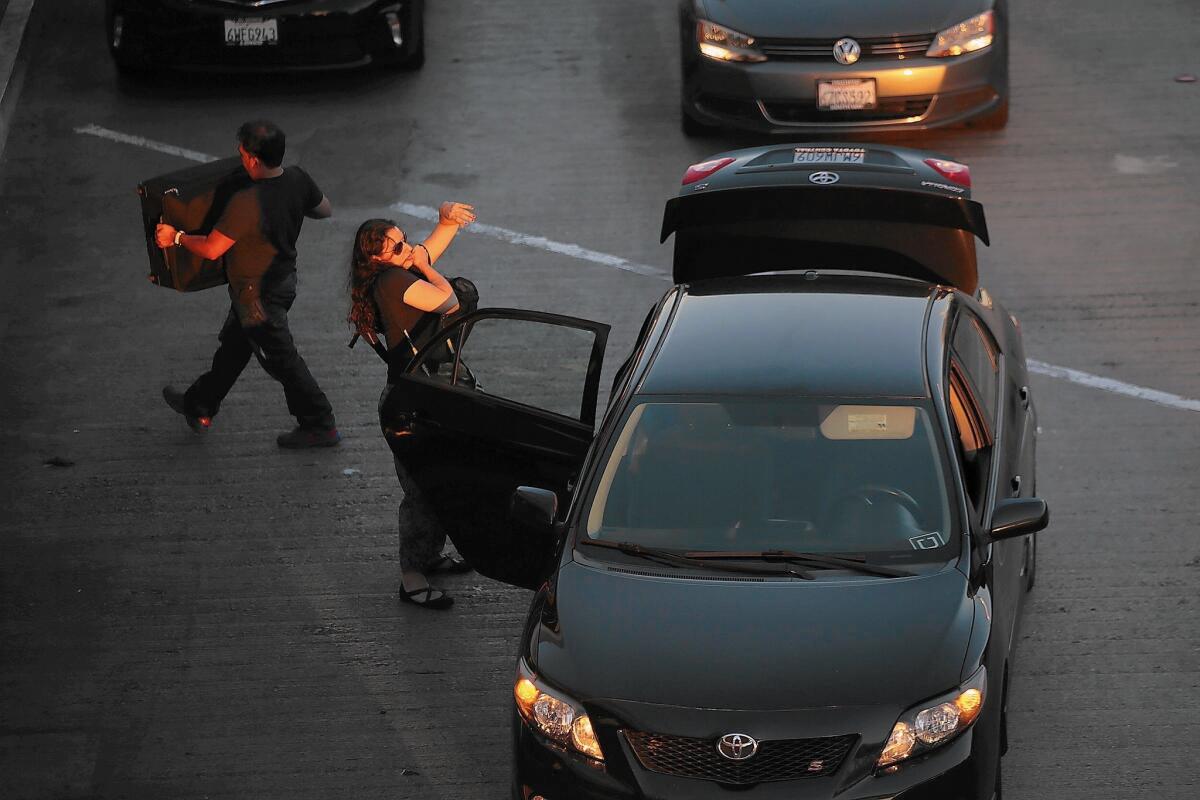Capitol Journal: Organizing bill aims to provide safety net for workers in ‘gig’ economy

Uber cars drop off passengers at Los Angeles International Airport’s Terminal One.
- Share via
SACRAMENTO — There’s about to be a new twist in the perpetual business-vs.- labor battle in California’s Capitol, one particularly relevant to the 21st century.
It involves how best to protect workers in the expanding “gig” or “sharing” economy while not stifling its tech-driven growth.
We’re talking about such enterprises as Uber and TaskRabbit where you can use a smartphone app to grab a ride or seek an errand helper. There are many such outfits that facilitate services on demand.
The companies contract with workers for brief gigs, something that used to pertain only to musicians. Now there are gigs for drivers, handymen, crosstown deliverers, errand runners and grocery buyers, among other service providers.
It allows the workers to choose their own hours. But the problem for most is that they’re not considered employees. They’re independent contractors. So legally they can’t unionize and aren’t eligible for company benefits.
No healthcare, paid time off or retirement plans. No unemployment insurance if they get fired or workers’ compensation if they’re injured on the job. No company contribution to their Social Security. They’re not guaranteed the minimum wage. They can’t even set their own price for service; it’s dictated by the company.
That, of course, greatly benefits the company. It operates on the cheap. But the flip side is it has less control over the workers. Uber, for example, can’t order a driver to haul drunken revelers on New Year’s Eve.
A solution about to be proposed in Sacramento, however, probably won’t make unions happy, let alone business.
It’s to bypass unions entirely and create a new organizing tool that allows groups of gig workers to collectively bargain with the company operating the app. It’s titled the California 1099 Self-Organizing Act — 1099 being the annual tax form independent contractors are supposed to receive from the entity paying them, such as Uber.
Richie Ross, a veteran political consultant and Capitol operative who got his start with Cesar Chavez in the United Farm Workers union, is the instigator of the proposal. He brainstormed with a longtime labor lawyer, Richard McCracken of San Francisco.
Assemblywoman Lorena Gonzalez (D-San Diego), a former labor leader, will introduce the bill after the Legislature reconvenes in January.
“As the economy changes, the law has to change as well,” Gonzalez says. “Our rules for unions come out of a different era. We have to accept that.
“There are pitfalls and benefits in the new economy. We need laws that promote and support it, but also protect the workers and ensure they don’t slip through the cracks. We can’t just let them go without a safety net, can’t allow this kind of unregulated atmosphere.”
Ross says, “We’re trying to cover people who have no power.”
The bill would apply only to workers who depend on a “business platform,” usually involving a mobile app, to acquire customers — rather than finding them through word-of-mouth or classified ads.
The company takes a cut of the service fee and doesn’t pay the worker’s expenses. There’s virtually no opportunity for workers to save for the future, Ross says, and “this is an historic time bomb that will make the unfunded [government] pension crisis look small in the next decade.”
That’s because taxpayers usually wind up providing the safety net when private enterprise doesn’t.
California has 1 million to 2 million such workers, Ross figures.
They’re not covered by federal labor laws. And if they tried to organize, McCracken says, they could be found in violation of antitrust laws. But there’s nothing preventing a state from creating another organizing system for these workers. It’s just that no state has.
In California, Uber drivers are suing to be reclassified as employees. That could affect 160,000 workers. If the drivers eventually win in court, they wouldn’t be covered by the bill. But more than 1 million other workers would be.
There are various estimates about the number of gig workers in the country, but a safe bet is about 10% of the workforce.
Polling shows that helping them is especially popular with millennials, those who turned 18 beginning in 2000. That’s undoubtedly because for many, including some college grads, gig work is the best they can find. Ross says 77% of them would vote for a ballot measure that could lead to gig worker organizing.
But running an initiative campaign costs millions. It’s hard to see how gig workers could raise that kind of money. And powerful special interests would write big checks in opposition. Labor wants the workers to be reclassified as employees so they can join unions. Business hates the notion of higher operating costs.
The sponsors’ best shot — still a long one without union help — is to push a bill through the Legislature. But even if it passed, Gov. Jerry Brown probably would be tempted to side with business and labor, vetoing the measure.
“This is going to be tough,” Gonzalez concedes. “But tough in a good way. I want to challenge people to think about this. It will require my colleagues to really stretch.
“I’m hoping I don’t get beat up by everybody. But I’m used to that.”
“California is the home of innovation,” Ross says. “This could be the coming thing.”
The lawmakers may not be ready for it.
But at least it’ll be a new fight in Sacramento, one pertinent to today’s reality.
Twitter: @LATimesSkelton
More to Read
Sign up for Essential California
The most important California stories and recommendations in your inbox every morning.
You may occasionally receive promotional content from the Los Angeles Times.











